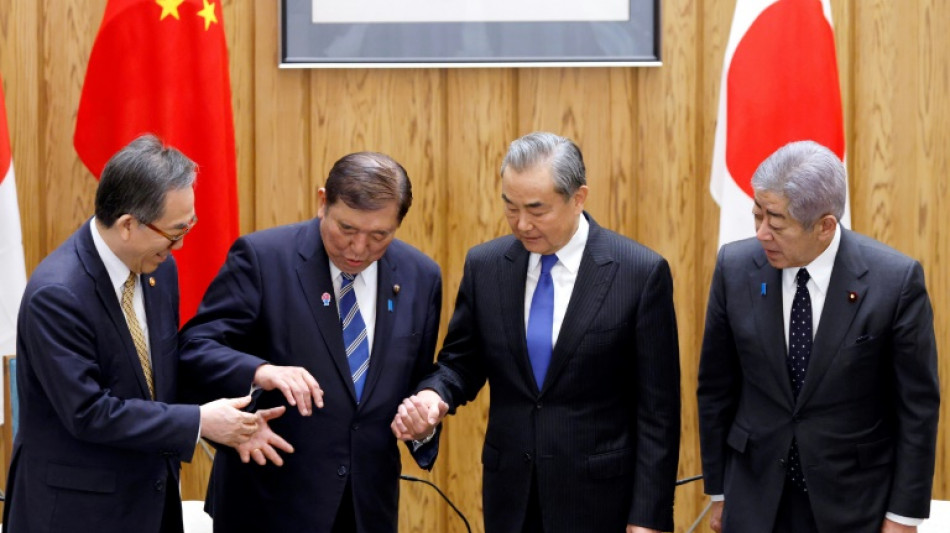
-
 At least 24 killed in Kashmir attack on tourists: Indian police source
At least 24 killed in Kashmir attack on tourists: Indian police source
-
Philippine typhoon victims remember day Pope Francis brought hope
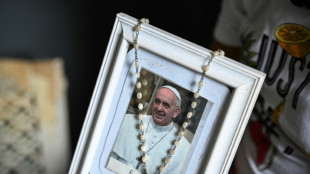
-
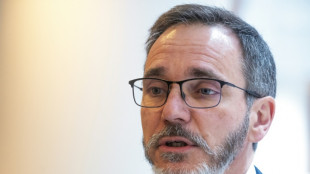 IMF slashes global growth outlook on impact of Trump tariffs
IMF slashes global growth outlook on impact of Trump tariffs
-
BASF exits Xinjiang ventures after Uyghur abuse reports

-
 Nordics, Lithuania plan joint purchase of combat vehicles
Nordics, Lithuania plan joint purchase of combat vehicles
-
Gold hits record, stocks diverge as Trump fuels Fed fears
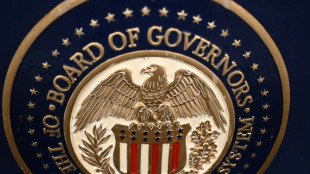
-
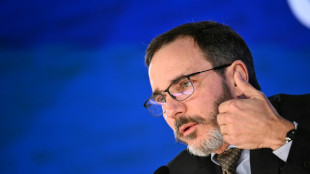 World could boost growth by reducing trade doubt: IMF chief economist
World could boost growth by reducing trade doubt: IMF chief economist
-
IMF slashes global growth outlook on impact of US tariffs

-
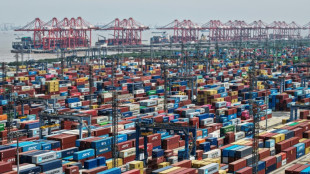 IMF slashes China growth forecasts as trade war deepens
IMF slashes China growth forecasts as trade war deepens
-
Skipper Shanto leads Bangladesh fightback in Zimbabwe Test
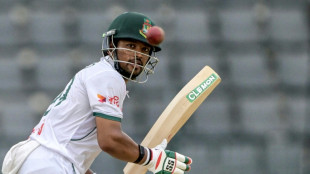
-
 US VP Vance says 'progress' in India trade talks
US VP Vance says 'progress' in India trade talks
-
Ex-England star Youngs to retire from rugby

-
 Black Ferns star Woodman-Wickliffe returning for World Cup
Black Ferns star Woodman-Wickliffe returning for World Cup
-
Kremlin warns against rushing Ukraine talks
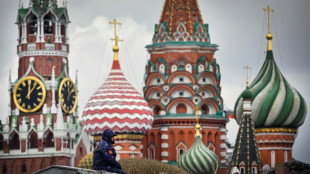
-
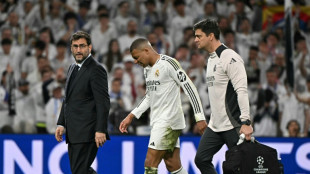 Mbappe aiming for Copa del Rey final return: Ancelotti
Mbappe aiming for Copa del Rey final return: Ancelotti
-
US universities issue letter condemning Trump's 'political interference'

-
 Pope Francis's unfulfilled wish: declaring PNG's first saint
Pope Francis's unfulfilled wish: declaring PNG's first saint
-
Myanmar rebels prepare to hand key city back to junta, China says

-
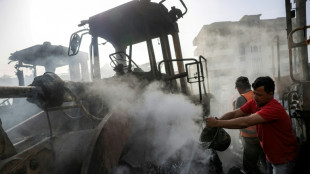 Hamas team heads to Cairo for Gaza talks as Israel strikes kill 26
Hamas team heads to Cairo for Gaza talks as Israel strikes kill 26
-
Pianist to perform London musical marathon

-
 India's Bumrah, Mandhana win top Wisden cricket awards
India's Bumrah, Mandhana win top Wisden cricket awards
-
Zurab Tsereteli, whose monumental works won over Russian elites, dies aged 91
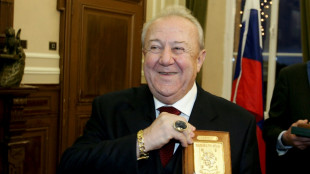
-
 Roche says will invest $50 bn in US, as tariff war uncertainty swells
Roche says will invest $50 bn in US, as tariff war uncertainty swells
-
Pope Francis's funeral set for Saturday, world leaders expected

-
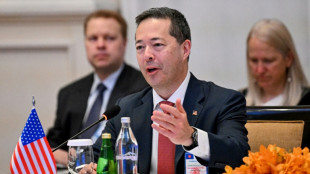 US official asserts Trump's agenda in tariff-hit Southeast Asia
US official asserts Trump's agenda in tariff-hit Southeast Asia
-
World leaders set to attend Francis's funeral as cardinals gather

-
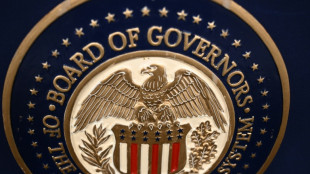 Gold hits record, stocks mixed as Trump fuels Fed fears
Gold hits record, stocks mixed as Trump fuels Fed fears
-
Roche says will invest $50 bn in US over next five years

-
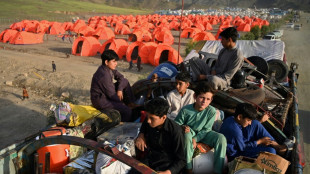 Fleeing Pakistan, Afghans rebuild from nothing
Fleeing Pakistan, Afghans rebuild from nothing
-
US Supreme Court to hear case against LGBTQ books in schools

-
 Pistons snap NBA playoff skid, vintage Leonard leads Clippers
Pistons snap NBA playoff skid, vintage Leonard leads Clippers
-
Migrants mourn pope who fought for their rights

-
 Duplantis kicks off Diamond League amid Johnson-led changing landscape
Duplantis kicks off Diamond League amid Johnson-led changing landscape
-
Taliban change tune towards Afghan heritage sites
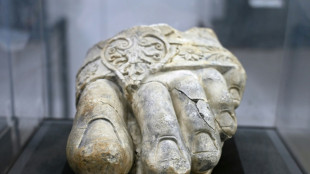
-
 Kosovo's 'hidden Catholics' baptised as Pope Francis mourned
Kosovo's 'hidden Catholics' baptised as Pope Francis mourned
-
Global warming is a security threat and armies must adapt: experts

-
 Can Europe's richest family turn Paris into a city of football rivals?
Can Europe's richest family turn Paris into a city of football rivals?
-
Climate campaigners praise a cool pope

-
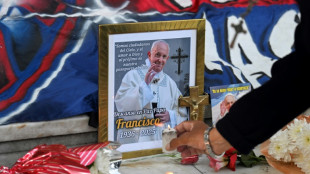 As world mourns, cardinals prepare pope's funeral
As world mourns, cardinals prepare pope's funeral
-
US to impose new duties on solar imports from Southeast Asia

-
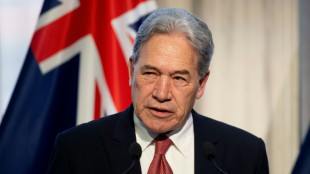 Draft NZ law seeks 'biological' definition of man, woman
Draft NZ law seeks 'biological' definition of man, woman
-
Auto Shanghai to showcase electric competition at sector's new frontier

-
 Tentative tree planting 'decades overdue' in sweltering Athens
Tentative tree planting 'decades overdue' in sweltering Athens
-
Indonesia food plan risks 'world's largest' deforestation
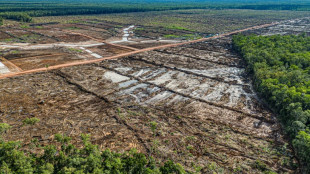
-
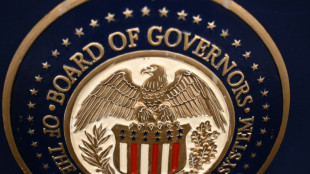 Gold hits record, stocks slip as Trump fuels Fed fears
Gold hits record, stocks slip as Trump fuels Fed fears
-
Trump helps enflame anti-LGBTQ feeling from Hungary to Romania
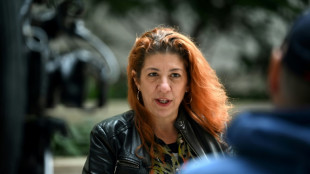
-
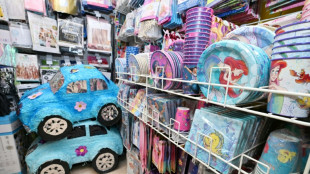 Woe is the pinata, a casualty of Trump trade war
Woe is the pinata, a casualty of Trump trade war
-
'Like orphans': Argentina mourns loss of papal son

-
 Trump tariffs torch chances of meeting with China's Xi
Trump tariffs torch chances of meeting with China's Xi
-
X rival Bluesky adds blue checks for trusted accounts


Japan, China, South Korea foreign ministers meet in Tokyo
Japan, China and South Korea's top diplomats hold talks in Tokyo on Saturday, aiming to bolster cooperation at a time when US trade tariffs are looming over the region.
The meeting follows a trilateral summit in May in Seoul where the neighbours agreed to deepen trade ties.
On the eve of the gathering, Japanese Foreign Minister Takeshi Iwaya had dinner with his South Korean and Chinese counterparts Cho Tae-yul and Wang Yi.
They then paid a courtesy call to Prime Minister Shigeru Ishiba, who said the nations have "significant influence and responsibilities for regional peace and prosperity".
"Although difficult problems sometimes arise because we are neighbouring countries, Japan hopes to engage in dialogues including on issues of concern and build a future-oriented cooperative relationship through pragmatic diplomacy," Ishiba told the ministers.
Climate change, ageing populations and trade were among the topics to be discussed, as well as how to work together on disaster relief and science and technology, Chinese foreign ministry spokeswoman Mao Ning told reporters.
The ministers aim to agree on arranging a trilateral summit within months, Japan's public broadcaster NHK reported.
They will also hold bilateral talks Saturday, while Japan and China will have their first so-called "high-level economic dialogue" in six years.
"China-Japan relations are currently showing a trend of improvement and development," Mao said.
One topic Iwaya highlighted as important ahead of the talks was China's imports of Japanese seafood, which it halted in 2023 after Japan began releasing treated wastewater from the stricken Fukushima nuclear plant into the ocean.
China said in September it would "gradually resume" the imports, but this has yet to begin.
- Tariff talk -
China and to a lesser extent South Korea and Japan have been hit by tariffs put in place by US President Donald Trump in recent weeks.
Patricia M. Kim, a foreign policy fellow at the Brookings Institution in Washington, said that while "trilateral dialogues have been ongoing for over a decade", this round "carries heightened significance" due to the new US position.
"Their leaders are under growing pressure to diversify their options and to seek alternative economic opportunities," she told AFP.
"As the three biggest economies in East Asia, it's not surprising that they would look to each other for opportunities," Kim said.
Beijing "has been working actively to improve relations with other major and middle powers amid growing frictions with the United States", she said.
The summit in May was the countries' first top-level talks in five years and saw the group reaffirm their goal of a denuclearised Korean peninsula, in reference to nuclear-armed North Korea.
Seoul and Tokyo typically take a stronger line against North Korea than China, which remains one of Pyongyang's most important allies and economic benefactors.
"The upcoming meeting is expected to prioritise economic issues in the wake of the Trump administration's hard push to raise import tariffs," said Lim Eul-chul, a professor at Seoul's Institute for Far Eastern Studies.
"With that in mind, the issue of North Korea may be addressed, but it is unlikely to be a top priority."
T.Zimmermann--VB
